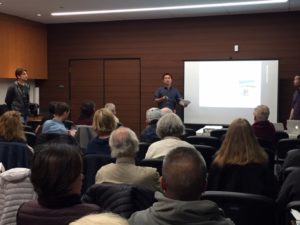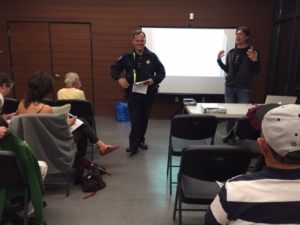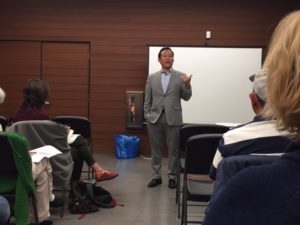BIKE SHARE PROGRAM: 
The hot button issue at the October 18 meeting was bike share in Glen Park. SFMTA has engaged the organization, Motivate, to manage the bike share program in San Francisco and other cities, utilizing Ford GoBikes at docked stations. Ford’s title sponsorship provides the bikes at no cost to the City.
Information about the program is available from SFMTA here.
An interesting story about bike share in the City is in the Bay City Beacon.
Adrian Leung, manager of SFMTA ‘s Bikeshare Program, and Justin Nguyen of Motivate, faced the audience of around 80.

Recently there’s been much consternation in Glen Park about two of the proposed locations for bike share stations: 19 docks at Randall and Chenery and 23 docks at Arlington and Miguel. (A third station at the BART station is under the authority of BART.) There has also been criticism of the notification process, or lack thereof, to neighborhood residents. For more background and explanation of this, see Heather World’s front-page story in the current Glen Park News (accessible online by clicking the “newspaper”at www.glenparkassociation.org.)
Leung and Nguyen put the bike share program in the context of the City’s policies of prioritizing public and alternate modes of transit over autos, and pedestrian safety; outlined its many public benefits; described the neighborhood outreach program and feedback and consensus-building mechanisms; and explained the decision-making process.
(See Motivate’s presentation here and SFMTA’s presentation here.)
The GoBikes will feature pedal-assist electric bikes as well as traditional bikes at 300 stations with 4,500 bikes, available citywide in 2019. They can be accessed by an app, Clipper card, or kiosk, for a single ride or a daily or monthly pass. There are many criteria for choosing the location of the stations, such as accessibility, proximity to transit and other likely destinations, and the convenience of the distance between stations. There’s a schedule for maintenance and cleaning of the stations and requests for services can be made through 311.
One person made the point that a good bus system takes more cars off the road than the bikes, and that age, mobility, multiple kids and packages affect the utility of a bike. It’s not a binary argument, said Leung. We need to have a broad vision of many different solutions to getting more cars off the roads.
The group still had many questions about the siting of the stations in Glen Park, although there was overall support for the bike share program itself. Leung pointed out that the system is being built out now, a lot of data is being gathered, and changes are possible. The final decision will rest with SFMTA.
After some discussion, it was agreed that, by the end of this month, Leung and interested residents would do a walk-through of the proposed locations, at 8:00 am and 3:00 pm, to evaluate some real time conditions under which the bike stations would be used.
HALLOWEEN STREET CLOSURE:
Captain Jack Hart was pretty psyched about Halloween this year and talked about the closure of Chenery Street from Diamond to Elk, and feeder streets, for Glen Park’s renowned and growing celebration. Details and a map are in Heather World’s GPA web post of October 19.
In contrast to prior years’ ad hoc invasion of ghosts, monsters, princesses (and politicians, this being SF), this year’s trick or treat parade will be officially sanctioned and its safety guaranteed by the efforts of the SFPD, Livable Cities, SFMTA and the Glen Park Association, among other organizations.

Captain Hart asked about any other issues in Glen Park. With the limited time allotted to him, he responded to the concern over Amazon package theft. He suggested the use of home surveillance cameras as the best deterrence, as well as the best evidence for apprehension of package thieves.
ASSEMBLYMAN DAVID CHIU:
Assemblyman Chiu gave an update on statewide issues he’s been working on.

Housing and homelessness top the list. Half a billion dollars are in the approved state budget to tackle these problems. He supports Propositions 1 and 2 that together would provide $6 billion in state funding for affordable housing for low income residents and supportive housing for the homeless who are mentally ill.
He opposes Proposition C, because the funds spent on homelessness have tripled in the past ten years, from $100 to $300 million, yet the homeless census has remained constant at 6,500 – 7,000. We need to know how current funds are being used before we throw more money at the problem. Approval of the proposition would mean the largest business tax increase in the city and take funds away from Muni, police, fire, libraries and children’s services, among other needs.
Chiu also opposes Proposition 6, the repeal of the gas tax. San Francisco has the worst quality roads in California, according to an independent analysis. This has resulted in over $1000 per year in vehicle maintenance costs to the motorist. The gas tax revenue is declining recently due to less driving and more fuel efficiency. The money is needed for maintenance of roads, tunnels and bridges.
Another of Chiu’s important issues is untested rape kits. This has been a crisis ten years in the making. Thirteen thousand kits are collecting in crime labs and sheriff’s departments, denying justice to victims and the wrongfully accused. In addition, if the perpetrator pleads guilty or the victim declines to press charges, and thus the kit isn’t tested, past crimes can go unpunished, and evidence for future crimes would be unavailable. Governor Brown signed a bill to require an audit of untested rape kits in the state.
Under the category Defending California from Trump: a pro-choice bill from 2015 is being challenged in the Supreme Court. California has filed a lawsuit regarding the addition of a question on the 2020 census about immigration status. We are an enormous donor state: We send $50-$60 billion to the federal government that we don’t get back in general services. Then we have to use bonds to fund our shortfall and levy funds from our ports and airports.
GLEN PARK ASSOCIATION BYLAWS UPDATE:
The bylaws of the Association need updating, as the current bylaws were written before electronic communication and other advances that have rendered the bylaws obsolete.
Among the changes proposed are that decisions are consistently made by majority vote; the use of electronic communications to communicate with the membership; clarification of duties of board members; ethical statements regarding conflict of interest, no political endorsements of candidates or parties; privacy of the membership list.
The proposed changes will be voted on in the January GPA meeting. Only current members or those who joined the GPA at least 21 days prior to the meeting, are eligible to vote.
To view the current and proposed bylaws, click the Glen Park Association tab on the GPA website, www.glenparkassociation.org.